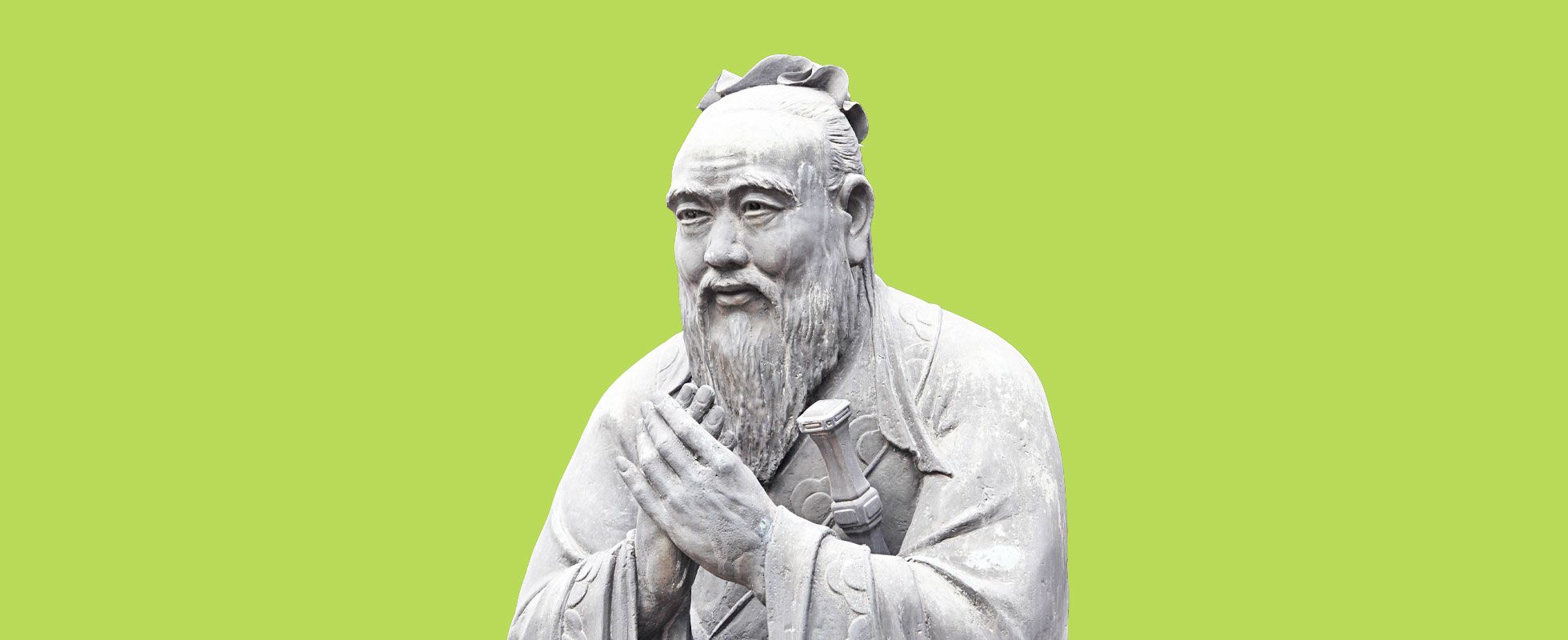The figure known to the Western world as Confucius was a Chinese philosopher whose ideas and teachings comprised Confucianism, a philosophical and ethical belief system that has formed the foundation for much of Chinese culture and society for the last 2,500 years.
Confucius was born in 551 BCE in eastern China. His father died when he was only 3 years old, and he was raised in poverty by his mother. He took an early interest in education (“at 15, my heart was set on learning,” he famously said), which would go on to form a core tenet of his own teachings.
Confucianism, while a complex thought system, emphasizes a few core principles, key among them being reciprocity, knowledge, virtue, harmony, loyalty, and self-cultivation. It also underlines the importance of family and community. Here are eight quotes that help demonstrate the philosophy of Confucius and his profound wisdom that still resonates to this day.
What you do not want done to yourself, do not do to others.
己所不欲,勿施於人 (yǐ suǒ bù yù, wù shī yú rén)
This sentiment is well known in the West, often expressed in Christianity as “do unto others as you would have them do unto you,” and known as the “golden rule.” Confucius believed in respecting others and treating them with kindness. This Confucius quote underlines what is considered to be — both by others and Confucius himself — the key to his teachings, and the one thing we should be sure to practice throughout life: reciprocity.
To study and not think is a waste. To think and not study is dangerous.
學而不思則罔,思而不學則殆 (xué ér bù sī zé wǎng, sī ér bù xué zé dài)
Confucius was keen on learning from the existing world around him, but he also believed in critical thought. Learning and thinking are complementary: If we merely read a book and don’t apply it in our own way to the real world, we risk not forming any real original opinions. On the other hand, if we parrot ideas based merely on things overheard, or facts not thoroughly examined, we run the risk of inheriting and perpetuating misinformation.
I am not bothered by the fact that I am not understood. I am bothered when I do not know others.
不患人之不己知,患不知人也 (bù huàn rén zhī bù jǐ zhī, huàn bù zhī rén yě)
While Confucius believed strongly in the power of reciprocity, he believed even more so in the superior person (or, in his teachings, the superior man). The superior man, Confucius said, is “satisfied and composed,” and does not need to be understood by others. To a self-cultivated person, the act of understanding others and engaging others is far superior to worrying about them doing the same. This goes hand in hand with another one of Confucius’ powerful quotes: “If one remains not annoyed when he is not understood by people around him, isn't he a sage?”
If I hear the way of truth in the morning, I am content even to die in that evening.
朝聞道、]夕死可矣 (zhāo wén dào, xī sǐ kě yǐ)
Living virtuously and aiming for moral superiority was a lifelong venture for Confucius. He believed that following the correct path every day ensured moral soundness and positive contributions to your community, and, ultimately, meant a person would die with no regret, even if the end should come unexpectedly.
A young man should serve his parents at home and be respectful to elders outside his home.
少年在家孝敬父母,在外孝敬长辈 (shàonián zàijiā xiàojìng fùmǔ, zàiwài xiàojìng zhǎngbèi)
A major part of Confucianism is something called filial piety, or respecting your parents, elders, and ancestors. This is demonstrated through service to your parents. Chinese culture, influenced by these philosophies, has long valued filial piety, and to this day, children — sons especially — are expected to care for their aging parents.
When we see men of worth, we should think of equaling them; when we see men of a contrary character, we should turn inwards and examine ourselves.
見賢思齊焉,見不賢而內自省也 (jiàn xián sī qí yān, jiàn bù xián ér nèi zì xǐng yě)
This Confucius quote focuses not only on our interactions with others, but again on self-cultivation. If we see an admirable quality in someone, we shouldn’t be envious, but should try to cultivate that within ourselves. If we see a negative quality in someone, instead of feeling superior, we should look deep within ourselves and reflect on our own internal struggles — because we all have them, and we must all work actively on diminishing them.
All things are nourished together without their injuring one another.
万物相养而不相伤 (wànwù xiāng yǎng ér bù xiāng shāng)
Reciprocity and harmony are two key tenets of Confucianism. Peaceful coexistence can be achieved through respecting each other, promoting interaction, and through it all, focusing on working on the self, not dominating the other.
Isn't it a pleasure to study and practice what you have learned?
學而時習之 (xué ér shí xí zhī)
With this joyous quote, Confucius once again celebrates his love of learning. He suggests that gaining knowledge is not only one of life’s great pleasures, but also a duty to put it into practice throughout life. This quote continues, “Isn't it also great when friends visit from distant places?” It highlights the importance of community and harmony — while not doing away with the fact that Confucius was, and encouraged others to be, self-possessed first and foremost.
Photo credit: typhoonski/ iStock via Getty Images Plus
















